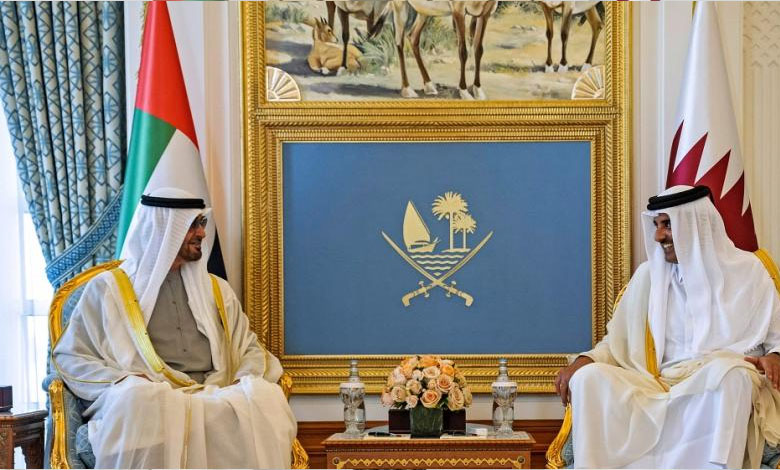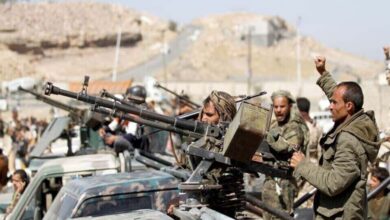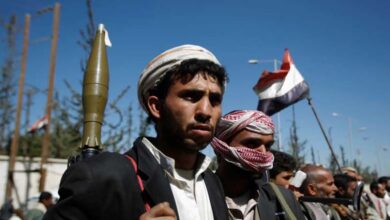UAE, Qatar discuss strengthening Gulf co-operation and support

UAE President Sheikh Mohamed bin Zayed Al Nahyan held talks here Monday with Qatari Foreign Minister Sheikh Khalifa bin Zayed Al Nahyan on ways to strengthen ties between the two countries and boost the Gulf region amid regional and international challenges, the official WAM news agency reported.
The visit is also the first of its kind since the Gulf reconciliation summit in January 2021 ended years of isolation after a crisis erupted between Doha on the one hand and Abu Dhabi, Riyadh, Manama and Cairo on the other.
The two sides discussed “brotherly relations and means to promote and develop joint cooperation in various fields in order to achieve the mutual interests of the two countries, within the framework of the fraternal bonds that unite the two brotherly countries and their peoples, and the joint keenness to consolidate them,” said the Emirates News Agency (WAM).
The emir met Sheikh Mohamed at the airport, according to the Qatari Amiri Diwan. The visit coincides with Qatar’s hosting of the World Cup.
The UAE news agency added that the Emir of Qatar expressed his aspiration that the visit would contribute to developing joint cooperation between the two brotherly countries and pushing it to wider levels.
For his part, Sheikh Mohamed praised the success of hosting the 2022 FIFA World Cup, which is a success and pride for all GCC countries and the Arab world in general, noting that the success of the State of Qatar in hosting this global event reflects the ability of the people of the region and the Arab countries to host various global events successfully and efficiently.
The two sides discussed “bilateral relations and ways of boosting them to wider horizons of fruitful cooperation, in a way that benefits both countries and serves their common interests, especially in the economic, investment and trade fields.”
The two sides also discussed “the importance of strengthening the Gulf joint action system in order to serve the interests of the peoples of the GCC countries and their aspirations for development, progress and prosperity.”
During the meeting, the two leaders reviewed a number of issues and files of common interest and the latest developments on the regional and international arenas.
The visit comes amidst a number of regional and international developments, including the escalation of Iranian threats in the Gulf and targeting of oil supplies, and the controversy over the decision to reduce oil production within the OPEC+ alliance, whose members will hold a virtual meeting this month.
The Gulf states, led by the United Arab Emirates, are on the side of Saudi Arabia, which is under pressure from the United States to cut output by two million barrels per day (bpd) as part of the OPEC alliance.
Saudi Arabia, the UAE, Bahrain and Egypt ended a three-and-a-half-year boycott of Qatar early last year, but relations between Abu Dhabi and Doha did not improve as much as Riyadh and Cairo, which restored diplomatic relations with Doha.
Saudi Crown Prince Mohammed bin Salman and Egyptian President Abdel Fattah al-Sisi attended the opening of the World Cup in Doha on Nov. 20. The UAE sent Dubai’s ruler, Sheikh Mohammed bin Rashid al-Maktoum, who is also vice president of the Gulf state.
The political dispute has seen Riyadh and its allies sever all ties with Qatar over Doha’s support for Islamist groups seen as a threat to the Gulf state’s governance and its relations with Iran and Turkey. The dispute has divided the six-nation Gulf Cooperation Council (GCC) before reconciliation is reached.
Saudi Arabia and the UAE then moved to engage Shia Iran in an effort to contain tensions and repair relations with Turkey amid their focus on economic development.
UAE National Security Advisor Sheikh Tahnoun bin Zayed Al Nahyan visited Doha twice as part of Abu Dhabi’s efforts to address regional differences.
Bahrain and Qatar have yet to hold bilateral talks. Abu Dhabi, like Manama, did not appoint an envoy to Doha, but it did resume relations regarding travel and trade between the UAE and Qatar.












